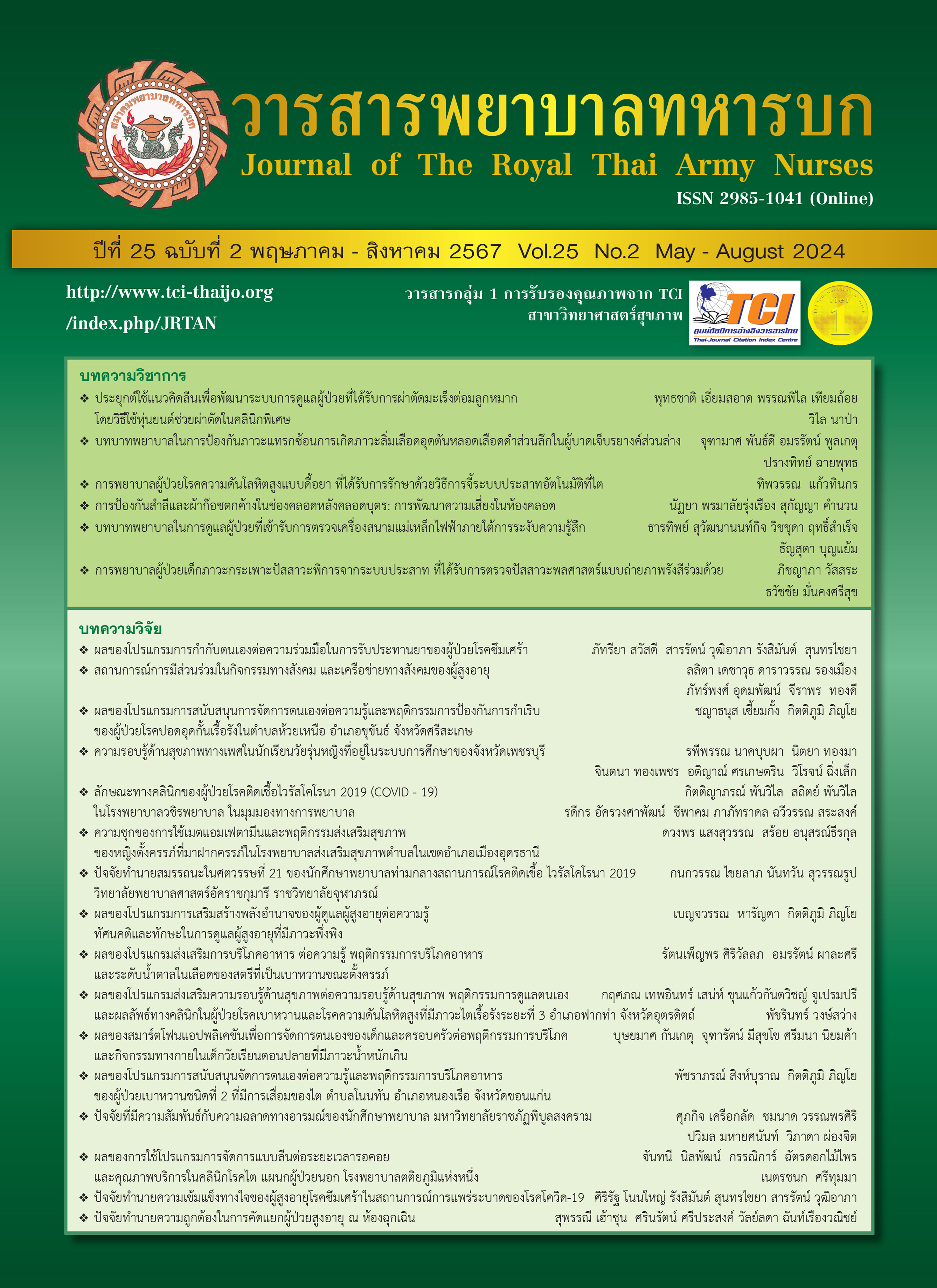Factors Predicting Colorectal Cancer Screening Behaviors among Thai People Living in Bangkok metropolitan
Keywords:
Colorectal cancer screening, Health believe modelAbstract
The predictive-correlation study aimed examining factors predictive colorectal cancer screening behaviors among Thai people living in Bangkok Metropolitan. The health belief model was used as a theorical framework. A sample of 553 participants aged between 50 and 75 years and lived in Bangkok, Thailand, were selected by multi-stage sampling method. The research instruments comprise demographic data, perceived susceptibility to disease, perceived severity of disease, perceived benefit, perceived barriers, perceived threat, cue to action, and behaviors of colorectal cancer screening, which were validated by experts (0.81, 0.92, 0.82, 0.85, 0.87, and 0.93, respectively
The result revealed that 35.62% of participants exhibited appropriate behaviors for colorectal cancer screening. Including fecal occult blood test (FOBT) and colonoscopy (19.89% and 15.73%, respectively). Furthermore, perceived barriers significantly predicted colorectal cancer screening behaviors (OR = 1.09, 95% CI = 0.89-1.08). Therefore, the result of study is able to be a fundamental data to develop a colorectal cancer screening program among Thai people living in Bangkok Metropolitan. It is important to provide knowledge about colorectal cancer through a factsheet in order to eliminate misunderstand regrading health beliefs on colorectal cancer behaviors among Thai people living in Bangkok Metropolitan.
Downloads
References
Lortet-Tieulent J., Georges D., Bray F., & Vaccarella S. Profiling global cancer incidence and mortality by socioeconomic development. International journal of cancer 2020, 147(11), 3029-36.
Lohsiriwat V, Chaisomboon N, Pattana-Arun J. Current colorectal cancer screening. Annals of Coloproctology 2020; 36(3): 78-82.
Tiankanon K., Aniwan S., & Rerknimitr R. Current status of colorectal cancer and its public health burden in Thailand. Clinical Endoscopy 2021; 54(4), 499–504. (in Thai)
Rosenstock IM, Becker M, Maiman L. Sociobehavioral determinants of compliance with health and medical care recommendations. Medical Care 1975; 13(1): 10-24.
Thaidumrongdet P. The lived experience of Thai immigrants who had not been screened for colorectal cancer screening (Doctoral Dissertation). Barry University; 2018.
Lee E, Natipagon-Shah B, Sangsanoi-Terkchareon S, Warda US. Lee SY. Factors influencing colorectal cancer screening among Thais in the United states. Journal of Community Health 2019; 44(2): 230-7.
Khuhaprema T, Srivatanakul P. Colon and rectum cancer in Thailand: An overview. Japanese Journal of Clinical Oncology 2008; 38(4): 237-43.
Khuhaprema et al. Organized colorectal cancer screening in Lampang Province, Thailand: Preliminaryresults from a pilot implementation program. British Medical Journal 2014; 4(1): 1-11.
Thanapirom K, Treeprasertsuk S, Rerknimitr R. Awareness of colorectal cancer screening in primary care physicians. Journal of the Medical Association of Thailand 2012; 95(7): 859-65.
Thato R. Nursing research: Concepts to application 3th ed. Bangkok: Chulalongkorn University Press. 2018.
Kadakuntla A, Wang T, Medgyesy K, Rrapi E, Litynski J, Adynski G, Tadros M. Colorectal cancer screening in the COVID-19 era. World Journal of Gastrointestinal Oncology 2021; 13(4): 238-51.
Harber I, Zeidan D, Aslam MN. Colorectal Cancer Screening: Impact of COVID-19 Pandemic and Possible Consequences. Life (Basel) 2021; 11(12): 1-12.
Bujang NN, Lee YJ, Mohd-Zain SA, Aris JH, Md-Yusoff FA, Suli Z, Abu-Hassan MR, BhooPathy N. Factors associated with colorectal cancer screening via immunochemical fecal occult blood test in an average-risk population from a multiethnic, middle-income setting. Journal of Clinical Oncology. 2021; 7(1): 333-41.
Gu J, Jia S, Chao H, Chen T, Wu X. Predictive factors based on the health belief model on cancer screening behaviour in first degree relatives of patients with Lynch syndrome-associated colorectal cancer. International Journal of Nursing Sciences 2023; 10(2):251-7.
Poomsanguan K., Prajankett O. Health belief model on pap Smear screening test among reproductive women in raikhing municipality of nakhonpathom province. Journal of The Royal Thai Army Nurses 2017; 18(3): 209-16 (in Thai)
Downloads
Published
How to Cite
Issue
Section
License
Copyright (c) 2024 Journal of The Royal Thai Army Nurses

This work is licensed under a Creative Commons Attribution-NonCommercial-NoDerivatives 4.0 International License.
บทความหรือข้อคิดเห็นใดใดที่ปรากฏในวารสารพยาบาลทหารบกเป็นวรรณกรรมของผู้เขียน ซึ่งบรรณาธิการหรือสมาคมพยาบาลทหารบก ไม่จำเป็นต้องเห็นด้วย
บทความที่ได้รับการตีพิมพ์เป็นลิขสิทธิ์ของวารสารพยาบาลทหารบก
The ideas and opinions expressed in the Journal of The Royal Thai Army Nurses are those of the authors and not necessarily those
of the editor or Royal Thai Army Nurses Association.






